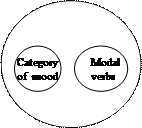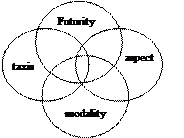Functional Grammatical Synonymy
SF
In its term a FSC is an invariant for various SFs of language units. A SF is a categorial meaning which is implied in the actual meanings of grammatical forms, function words, syntactic structures and the meanings of lexica-grammatical classes of words.
The plane of content of SFs has 2 aspects:
- potential
- teleological
The potential aspect can be described as the ability of this or that unit to realize a certain semantic function.
The teleological aspect coincides with the widely accepted definition of function as the purpose or aim of using different language means.
NC of determinateness
↓
FSC of definiteness and indefiniteness
↓ ↓
SFs individualizing etc. concrete nomination etc.
FSF
A field approach to language description is not new, it was first used in lexicology to describe lexical fields in German and Russian. In grammar the notion of a field is based on the variant-invariant relations. The semantic basis of the FSF is FSC realized by different SFs. The plane of expression of a SFS is made up of different language forms which serve to render these SFs.
A FSF is a bilateral unity and it is a sphere of interaction of grammatical and non-grammatical language means.
 FSF
FSF
The nucleus of a FSF can be expressed by the following units:
1) a grammatical category
FSF of temporality → GC of tense
FSF of aspectuality → GC of aspect
FSF of taxis → GC of order
2) a grammatical form
FSF of subject-object relations → GF of possessive case
3) a grammatical class of words
FSF of definiteness and indefiniteness → an article
4) a lexico-grammatical class of words
FSF of quality → adjectives
5) a syntactic structure
FSF of condition, concession, etc. → different types of clauses
FSF can be monocentric and polycentric
FSF of temporality FSF of modality
 |  | ||
FSFs can overlap with each other fields.
 |
To sum up
What are the fundamental features of functionalism?
1) Languages are viewed as tools of communication. SO the principle language function is communicative from which all the other functions can be derived.
2) Language is viewed as teleologicaly motivated activity.
3) All extralinguistic factors are taken into account
4) A special relations between form and function are recognized
5) Function and its realization in speech are the main task of functional analyses
Functional Grammatical Synonymy
Synonymy is a type of semantic relations between and among language units which presuppose full or partial similarity of their meaning.
The theory appeared in the 30s of the XX century.
One of the basic issues of grammatical synonymy is the problem of criteria of synonyms. The possible approaches are as follows:
1) The main criteria is the notional similarity (Пешковский, Степанов). It means that grammatical synonyms are different means of expressing one and the same deep structure.
E.g. The worker are building the house.
The house is being built by the workers.
The wall is white
The whiteness of the wall
2) Situational similarity or in other words the description of the same situation of objective reality by different language means (Гак)
E.g. Peter sold the house to John.
John bought the house from Peter.
3) Position similarity (Адмони) If different structures can fill the same position in the sentence they can be regarded as synonyms.
e.g. There/in the house/in this 5-stored house/ in the house that was built by John/etc.
4) Presupposes similarity of grammatical meanings (Бархударов, Иванова, др.)
There are different levels of grammatical synonymy which partially reflect different levels of the grammatical structure of language.
1. Morphological synonyms require similarity of their denotational meaning but different connotations.
e.g. I’m frank.
I’m being frank.
2. Syntactic synonyms presuppose the similarity of syntactic functions of language units which are structurally and lexically different.
e.g. When he opened the door he saw a stranger.
Having opened the door he saw a stranger.
3. Interlevel synonyms
e.g. On coming back home he started working.
When he came back home he started working.
He came home and started working.
Interlevel synonyms can be described as language units of different kinds which collaborate on the basis of common semantic function.
What language units can be described as functional grammatical synonyms?
1) They should perform one and the same semantic function
2) They can be structurally similar or different
3) They don’t have to be lexically identical
4) The mutual substitution of synonyms is not obligatory condition, but a consequence of synonymy in its highest degree.